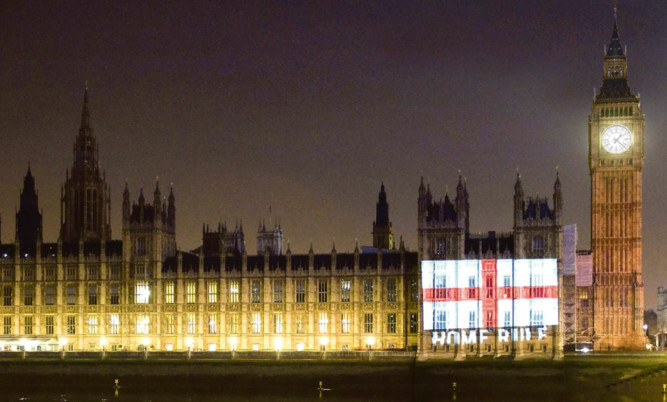
The English are finding a voice and they want to say ‘Get Lost’.
The future of the UK could come under threat again within just a few years.
Shock new polling shows huge differences between Scotland and England’s attitudes towards Europe. And that, coupled with the twin-track approach to tackling devolution in the two biggest parts of the UK, has led some to claim there could be another independence referendum before the decade is out.
But this time it will be the English trying to break free from the rest of the UK.
Eddie Bone, chairman of the Campaign for an English Parliament (CEP), said: “The English have had enough, they’re fed up and they’re expressing their concerns.
“Scotland had a very inward-looking debate that excluded the other parts of the UK. Now we’re going to have the same and Scotland, Wales and Northern Ireland will be excluded and they’ll have to accept what’s decided.
“We are the largest part of the UK so for me there’s no sense of England breaking away from the UK, it’s not unreasonable to say it’s more like telling the other parts to get lost.”
He claims the CEP has been bombarded with phone calls since the Scottish independence referendum and seen donations rise by at least 25%.
Polling carried out for the “Taking England Seriously” report set to be published this week found that while the English want out of the EU by a narrow margin, Scots want to stay in.
Of those to have made up their mind 52% of the 3,700 English voters polled want to leave Europe compared with 48% keen to stay in, meaning any referendum would be on a knife-edge if it was down to English votes alone.
However, in Scotland, a clear majority 60% want to remain in the EU with just two out of every five voters keen to exit.
On the basis of the polling figures those in favour of leaving Europe would win a referendum by four points.
Earlier this year the London School of Economics’ Professor Patrick Dunleavy warned that if there was an EU referendum in 2017, as promised by the Conservatives should they win next year’s general election, and English votes saw the UK leave against the will of Scots he could envisage another independence vote within just a few years.
But the new figures also raise the prospect of Scottish votes keeping the UK in the EU against the will of the English if the vote was much larger north of the Border.
Report author Charlie Jeffrey, of Edinburgh University, said: “If the UK voted out with a clear vote in Scotland to stay in that would very quickly lead us back into the debate around Scottish independence.
“And the other scenario would be equally explosive.”
Eddie Bone added: “If there is an EU referendum we believe that will be a crisis point and maybe a breaking point for the constitution.
“Currently Englishness is only expressed through anti-EU parties.”
Bone believes that point will be echoed when the “Taking England Seriously” report is published. It is jointly authored by academics from the University of Edinburgh, Cardiff University and the Institute for Public Policy Research in London.
The report is expected to point to the difference of opinions over Europe as just one factor that demonstrates a clear English identity that will have to be accommodated in any new constitutional settlement for the UK.
Europe, immigration and dissatisfaction with Westminster are believed to be driving a new sense of Englishness. The very same factors are behind the rise of Ukip, who added to their European elections victory in May with a brace of by-election successes last week. They saw their first elected MP returned in Clacton and came within a whisker of defeating Labour in Heywood and Middleton. But so far they are resisting playing the English card as an electoral ace.
David Coburn is their Scottish MEP. He explained: “I’ve been chairman of Ukip London and I get the same reaction on doorsteps in England as I do in Scotland.”
However Nigel Farage has called for England to have “a voice” and he used a publicity stunt after the referendum to mail letters to every Scots MP calling on them to voluntarily sit out votes on English matters something the SNP already does.
Ukip policies so far are thin but it’s likely they’ll tackle the England question in their next manifesto.
David Coburn said: “If I’m elected as an MP for a Scottish seat next May I won’t vote on English only matters. If other Scottish MPs couldn’t voluntarily sign up to that then we’d have to go further. We have to decide as a nation how we’re going to tackle this but we all have to play fair.”
Eddie Bone though rejects the current Westminster timetable that would see further Scottish devolution fast tracked while England would have to wait for a solution.
He warned: “For the relationship between the different parts of the UK to be maintained it must be fair and everyone must be treated equally.
“If Scottish devolution goes through quickly without any consultation on the English side then that will be the end of the union.
“The independence referendum has made English people aware of this issue and there is more anger about it than I’ve ever seen.”

Enjoy the convenience of having The Sunday Post delivered as a digital ePaper straight to your smartphone, tablet or computer.
Subscribe for only £5.49 a month and enjoy all the benefits of the printed paper as a digital replica.
Subscribe